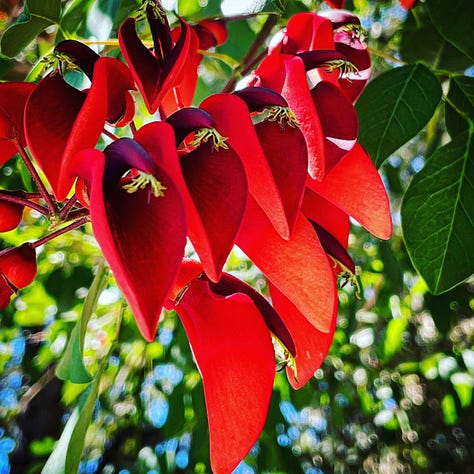


This funny year
This funny year - perhaps two - a catalog of losses
Not fun-ny, just funny. A dour stranger
admitting to nothing but a single solar spin
while umpteen cycles palpitate this leaden heart
Wilding river wiped me out, fracturing me
in places I didn’t know cracks had lived
carrying her away, mingling my mother to sand
*
My last call with her on video plays on and on
A broken TV grasping scenes from missed channels
for endings I should have seen coming. I didn’t
Bland periods ending half finished sentences
Motley memories in snatches of her, vital even in staccato
Mending me, consoling me. Let it go…
Stop … sadness…stop | No … tears | …bahadur girl
*
She did come home, stilled in death with
instructions and rituals dismissing denial
Prepare the body. Give her to the fire
Collect her ashes into the pitcher of clay
Carry her to the Ganga. Let the river take her…
Different indifferent pundits chant, calling for the son
I hear her laugh, There’s no son…
*
Gushing Ganga gathers her up, away
Passing waters witness to the town of her youth
I keep watch on the shore. Look for the girl
swimming unbeaten crossing these unyielding waters,
dreading school and its Ramayana by rote
giving up her beloved music the family can ill afford
Oh how she lives! Flowing fierce and free
*
I submit to the year of flooding grief
Yet the waters yield to herald new loves
Forging distant banks with bridges and vows
young weddings arrive with pomp and demand
Conspiring in flow, this funny year, brings
six weddings where I give my blessings
after one funeral that made me an orphan.
###
Reena | December 2022
December arrives heavier and faster this time. This poem arose as I sat down to catalog the year. It speaks to my grief in losing my mother while noting how inexorably the cycle of life marches on.
Like many who’ve endured losing parents, I didn’t get a proper goodbye. Getting closure in the death of loved ones — particularly parents in distant lands — is a rare gift. I came back hurting, needing to make sense of my loss. In my quest I read a lot. Two books, written from ostensibly distant perspectives, stood out…
The first - How we die (1993) - by a medical doctor Sherwin Nuland outlines in stark, clinical terms how we die, exactly what happens to our bodies when they fail. Nuland’s book counters the myth of a serene and beautiful death. Death, he says is simply the end of the biological being, and offers little meaning in its arrival. The only meaning to be found is in life itself.
The second book - The beauty of what remains - written by Steve Leder, a rabbi, is a spiritual take on death and grief. In Leder’s conception we often discover life’s meaning in the death of loved ones. He’s particularly insightful about how death lays bare our raw feelings about the departed, all of which we need to accept with grace AND honesty, honoring both ourselves and those passed.
Both books helped me face the many facets of grief, including the irreparable loss of India, as a home for me — an unanticipated primal untethering. And to seek meaning in the memory of bedrock moments and happy times with my mother.
Rituals of death and grief
Slowly, I’m coming to appreciate the attention and honoring that grief demands. I’ve found it necessary to recede for a time. Friends and professionals in the field tell me it can take years to feel close to “normal”. Reading about grieving rituals across cultures has helped. The Victorians wore black for two years after a loved one’s death. Hindus renounce all festivities for a year. These practices were probably intended to help mourners, so they wouldn’t have to remind people of their state of mind, or explain why they needed space from social engagements.
This is no prescription for unthinkingly adopting rituals, too many of which are still enforced as dogma. But rituals aligned with a thoughtful recognition of human nature can provide solace.
Even an atheist like me found some comfort in Hinduism’s stark last rites (which typically exclude women - that part to be ignored). Brooking no pretense, these rituals aren’t for the faint of heart. Unlike the sanitized death practices in most of the modern world, in Hinduism the dead are brought home to be cleansed and prepared for cremation. Once cremated their ashes are collected by hand by family members into a clay pitcher; then taken to a river for submersion. These rituals were perhaps designed to prevent any denialism among the living. Bringing home squarely the reality of our impermanence, our eventual return to dust and ash, these rites encourage the living to focus on what’s essential in life.
Remembering her… fierce and free
Visiting Haridwar to submerge her ashes, reminded me that she also grew up in that town. Her family settled there after fleeing their ancestral home in Peshawar following India’s bloody 1947 Partition.
My mother was a great storyteller and we’d listen in rapt fascination to her stories, including several from her childhood in Haridwar: how she’d swim across the Ganga as a teenager — no small feat considering the river enters the plains in Haridwar and its frigid waters rush through the town with a ferocity that sweeps away much and many; how she’d get in trouble in school for failing to learn the Ramayana by rote, instead pining to study in Rabindranath Tagore’s Shantiniketan; or having to give up her beloved singing lessons, because of the family’s strained financial situation (they’d lost everything in Partition). She would tear up remembering her music teacher, a greatly talented man who died unrecognized, in penury. She never went back to learning formally, but sang all the time. I just have to close my eyes to see her sitting in a saree, singing at social gatherings.
There’s so much of her in everything I do, love, believe and act on, despite butting heads with her well into my 20’s. Now I listen for her voice to guide me in my grief exhorting me to be bahadur (brave) when I despair…
Yet, life conspires…
…and this year’s catalog registers happier entries too, with a lineup of — weddings! Six of them!
At first I simply wanted to hide, excuse myself from it all. But life is deaf to our claims, playing its own music, demanding we dance its bidding. So I was forced to rise and show up to celebrate and take part and heart in the mingling and the joyous celebration to bless young ones launching their unions. It’s what my mother would’ve wanted, as I wrote here.
I’m not done grieving and grief is not done with me. Yet, I also know grief is love AND its price. I pay willingly.
I hope this accounting of my year will give you succor, should you ever need it.
Meanwhile, I wish each of you a dazzlingly Happy New Spin around the Sun ahead!
Extra!
A beautiful poem - NOT about a lanyard…







“But life is deaf to our claims, playing its own music, demanding we dance its bidding.”
This has been the hardest part, I think, of losing my father-in-law. Life, as you say above, marches inexorably on, and it (and the other people involved in it) don’t have much of an attention span for others’ grief.
Thank you for sharing this, if only for the commiseration. ❤️
No words really - anything goes. Grief is just there. In the smile, laughter and the fleeting tears which are removed even before they threaten to fall.